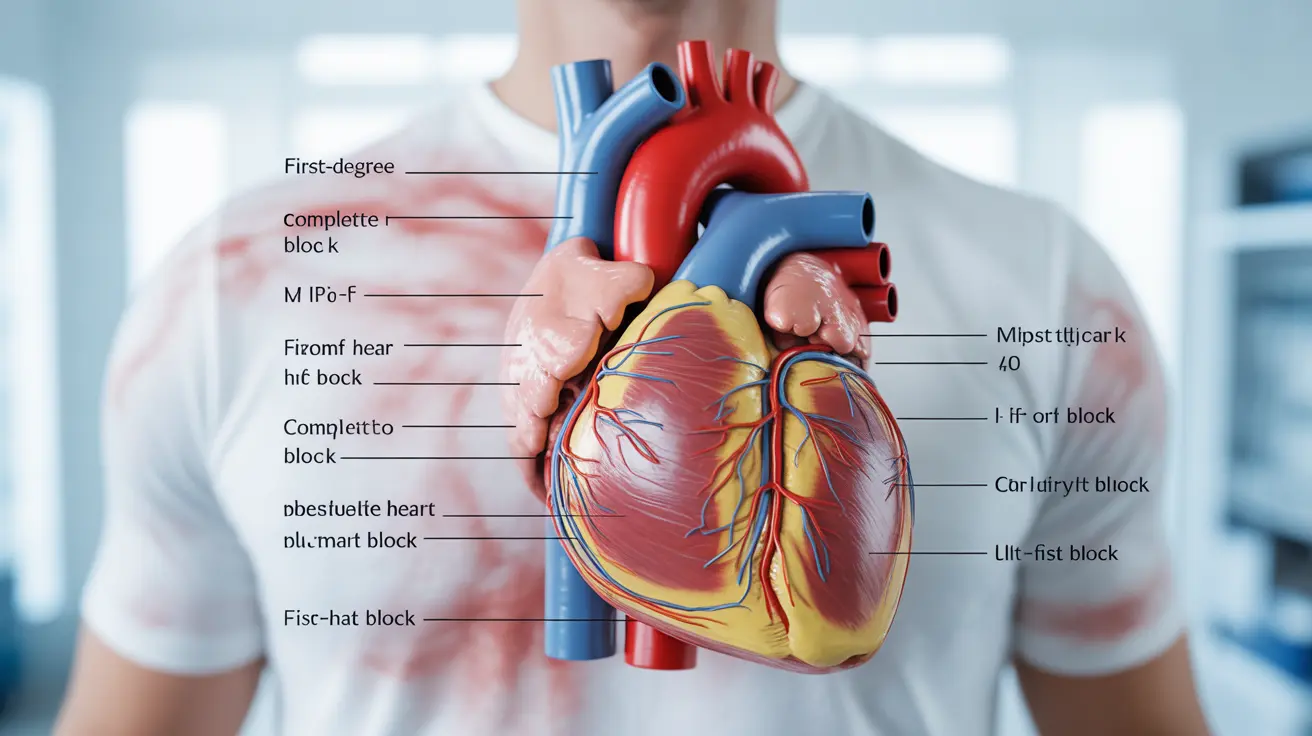Heart blocks are significant cardiac conditions that affect the heart's electrical system, specifically disrupting the normal flow of electrical signals that coordinate heartbeats. These electrical disturbances can range from mild to severe, potentially impacting how effectively your heart pumps blood throughout your body. Understanding heart blocks is crucial for early detection and proper medical intervention.
This comprehensive guide explores the various types of heart blocks, their symptoms, diagnostic approaches, and available treatments, helping you better understand this important cardiac condition.
Types and Degrees of Heart Blocks
Heart blocks are classified into three main degrees, each representing different levels of electrical signal disruption:
First-Degree Heart Block
The mildest form of heart block, where electrical signals are slowed but still reach all parts of the heart. This type rarely causes symptoms and often doesn't require treatment.
Second-Degree Heart Block
This intermediate condition comes in two forms:
- Mobitz Type I (Wenckebach): Progressive slowing of electrical signals
- Mobitz Type II: Some electrical signals fail to reach the ventricles
Third-Degree Heart Block
Also known as complete heart block, this most serious form occurs when electrical signals from the upper chambers fail to reach the lower chambers entirely. This condition typically requires immediate medical attention and often needs a permanent pacemaker.
Recognizing Heart Block Symptoms
The symptoms of heart blocks can vary significantly based on the type and severity:
- Dizziness or lightheadedness
- Fainting (syncope)
- Fatigue
- Shortness of breath
- Chest pain
- Slow or irregular heartbeat
Some individuals, particularly those with first-degree heart block, may experience no symptoms at all. However, more severe forms typically produce noticeable signs that shouldn't be ignored.
Diagnostic Procedures
Healthcare providers use several tests to diagnose heart blocks:
Electrocardiogram (ECG)
This primary diagnostic tool records the heart's electrical activity and can identify the type and severity of the heart block.
Holter Monitor
A portable ECG device worn for 24-48 hours to track heart rhythm changes during daily activities.
Other Tests
Additional diagnostic procedures may include:
- Exercise stress tests
- Electrophysiology studies
- Blood tests to check for underlying conditions
Treatment Approaches
Treatment options vary depending on the type and severity of the heart block:
Conservative Management
First-degree and some second-degree heart blocks might only require monitoring and regular check-ups if they're not causing symptoms.
Medical Intervention
More severe cases may require:
- Temporary pacemaker during acute situations
- Permanent pacemaker implantation
- Medication adjustments if the block is medication-induced
- Treatment of underlying conditions
Frequently Asked Questions
What are the different types and severity levels of heart block?
Heart blocks come in three main types: first-degree (mild), second-degree (moderate), and third-degree (complete). First-degree involves delayed signal transmission, second-degree shows intermittent blocking, and third-degree represents complete signal blockage between the heart's upper and lower chambers.
What symptoms should make me suspect I have a heart block?
Key symptoms include dizziness, fainting, fatigue, shortness of breath, chest pain, and slow or irregular heartbeat. However, some people, especially those with first-degree heart block, may not experience any symptoms.
How is heart block diagnosed and what tests are used?
Heart blocks are primarily diagnosed through electrocardiogram (ECG) testing. Additional diagnostic tools include Holter monitors, exercise stress tests, and electrophysiology studies. Blood tests may be performed to identify underlying conditions.
What treatments are available for each type of heart block, especially severe cases?
Treatment ranges from monitoring for mild cases to permanent pacemaker implantation for severe cases. First-degree blocks often need no treatment, while third-degree blocks typically require permanent pacemakers. Second-degree blocks may need either approach depending on symptoms and severity.
Can heart block be caused by medications or other reversible conditions?
Yes, certain medications (particularly beta-blockers and calcium channel blockers) can cause heart blocks. Other reversible causes include electrolyte imbalances, inflammation, and some infections. Addressing these underlying causes can sometimes resolve the heart block.




